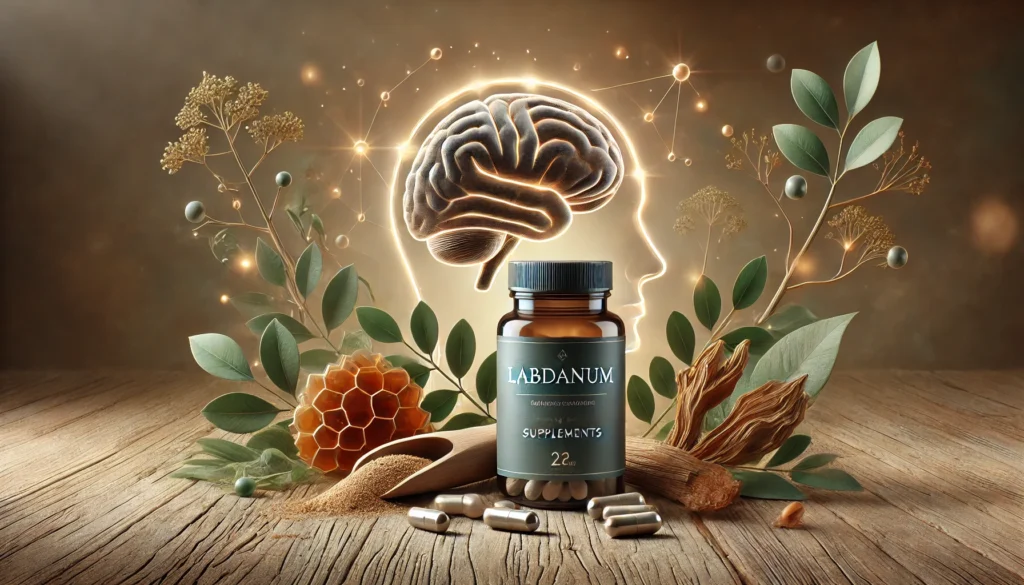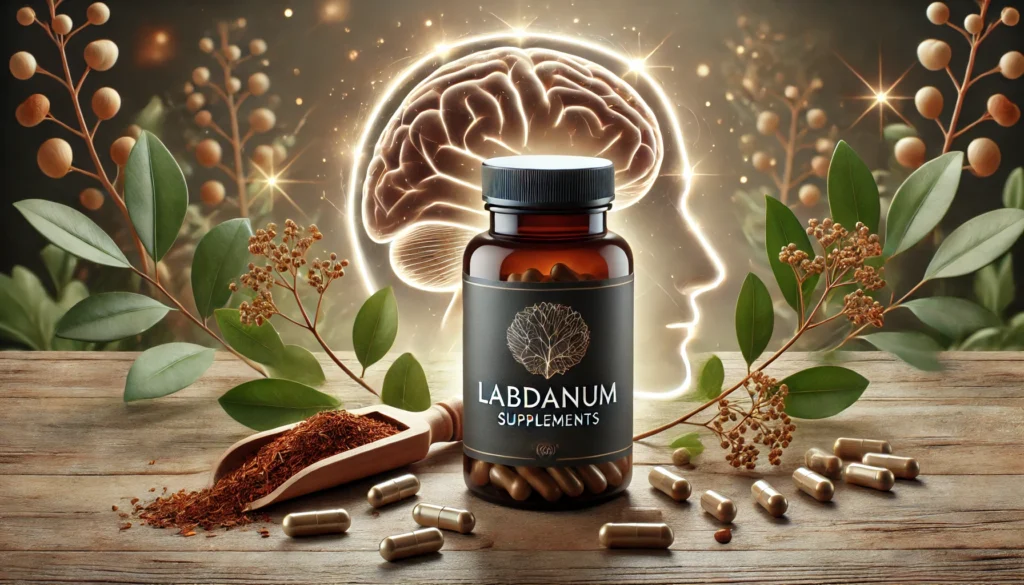Labdanum, a resin derived from the Cistus species of plants, has been revered for centuries for its medicinal, aromatic, and therapeutic properties. Traditionally used in perfumery and natural remedies, recent interest has focused on its potential cognitive and neuroprotective benefits, positioning it as a candidate nootropic supplement. Rich in bioactive compounds such as terpenes, phenolics, and essential oils, Labdanum may support brain function, mood, and overall mental clarity.
This article provides an in-depth exploration of Labdanum’s potential as a nootropic, covering its sources, chemistry, physiological mechanisms, benefits, dosing, side effects, interactions, and safety considerations. With a focus on scientific detail and responsible supplementation, we evaluate Labdanum’s potential role in enhancing cognitive health.
You May Also Like:
Labdanum: Potential Nootropic Benefits, Dosage, Side Effects, Interactions, and Other Important Information About This Supplement is an original (NootropicsPlanet) article.
Sources of Labdanum
Labdanum originates from the resinous exudate of Cistus ladanifer and Cistus creticus, plants native to the Mediterranean region. This sticky resin has been traditionally collected by hand or using tools like leather straps brushed against the leaves.
1. Natural Sources
- Cistus ladanifer (Rock Rose): This species is a primary source of Labdanum resin, known for its rich aromatic compounds.
- Cistus creticus: Found in Crete and surrounding regions, this plant also yields Labdanum with slight variations in its chemical profile.
- Extraction Methods: Labdanum resin is extracted through boiling or solvent methods, yielding a concentrated substance rich in bioactive compounds.
2. Supplemental Forms
Labdanum is available in the form of essential oils, tinctures, and powdered extracts. Modern nootropic supplements sometimes include Labdanum for its antioxidant and anti-inflammatory properties, which may support brain health.
While traditional methods relied on direct use of the resin, contemporary formulations standardize active compounds, making supplementation more precise and accessible.

Chemistry of Labdanum
Labdanum is composed of a diverse array of bioactive compounds, including diterpenes, sesquiterpenes, flavonoids, and phenolic acids. These molecules are responsible for its aromatic and pharmacological properties.
- Diterpenes: Compounds such as labdane derivatives are believed to contribute to Labdanum’s anti-inflammatory and neuroprotective effects by modulating cellular signaling pathways.
- Flavonoids: Known for their antioxidant activity, flavonoids in Labdanum scavenge free radicals, protecting neurons from oxidative stress.
- Essential Oils: Labdanum contains volatile compounds such as pinene and camphene, which may influence mood and mental clarity through their interaction with the central nervous system.
The complex chemistry of Labdanum provides a multi-targeted mechanism of action, combining antioxidant, anti-inflammatory, and mood-modulating properties.
Physiological Mechanisms of Labdanum in the Body and Brain
1. Antioxidant Defense
Labdanum’s rich phenolic content helps neutralize reactive oxygen species (ROS), reducing oxidative damage in brain tissues. This mechanism is crucial for preventing neurodegenerative processes associated with conditions like Alzheimer’s and Parkinson’s disease. Its antioxidant properties also support the regeneration of other antioxidants like glutathione, enhancing overall cellular defense systems.
2. Anti-Inflammatory Action
Chronic inflammation in the brain, or neuroinflammation, is a significant contributor to cognitive decline. Labdanum’s diterpenes inhibit pro-inflammatory cytokines, potentially reducing inflammation in neural tissues. This reduction in inflammation may also improve synaptic plasticity, which is vital for memory and learning.
3. Mood Regulation
The essential oils in Labdanum, including linalool and pinene, interact with the limbic system, the brain’s emotional center. This interaction may promote relaxation, reduce anxiety, and enhance mood, contributing to mental clarity and emotional resilience. By influencing neurotransmitter systems, Labdanum may also help balance serotonin and dopamine levels, which are key to mood stabilization.
4. Neuroprotection
Through its combined antioxidant and anti-inflammatory properties, Labdanum may protect neurons from excitotoxicity and apoptosis (programmed cell death). This protective role extends to maintaining synaptic integrity, critical for learning and memory. Additionally, Labdanum’s ability to shield neurons from oxidative damage may enhance long-term brain health and resilience against age-related decline.

Nootropic Benefits of Labdanum
1. Cognitive Clarity and Focus
Labdanum’s antioxidant properties help combat oxidative stress, a key factor in mental fatigue and impaired focus. By supporting mitochondrial function and reducing oxidative damage, Labdanum may enhance mental clarity and sustained concentration, particularly in demanding cognitive tasks. This makes it especially beneficial for individuals who experience brain fog or mental exhaustion due to stress or aging. Furthermore, its potential to boost cerebral blood flow could improve oxygen and nutrient delivery, ensuring optimal brain performance.
2. Stress Reduction and Emotional Balance
The aromatic compounds in Labdanum, such as terpenes, influence the central nervous system to promote relaxation. This stress-relieving effect can improve emotional balance and resilience, particularly during high-pressure situations. Labdanum’s mood-enhancing properties also make it a natural choice for those looking to manage anxiety or emotional instability without pharmaceutical interventions. In addition, its calming effects may improve sleep quality, indirectly supporting better cognitive functioning.
3. Memory Support
Labdanum’s neuroprotective properties may preserve synaptic health, which is vital for memory formation and recall. Preliminary studies suggest that its anti-inflammatory effects could slow cognitive decline in aging populations. Regular use may improve working memory and recall in both healthy adults and those with mild cognitive impairments. By protecting neurons from damage, Labdanum could help maintain memory function even under conditions of oxidative or inflammatory stress.
4. Neurodegenerative Prevention
By mitigating oxidative damage and inflammation, Labdanum may help reduce the risk of neurodegenerative diseases. The flavonoids and diterpenes in Labdanum offer a two-fold protective mechanism, preserving neuronal integrity and preventing cellular degeneration. These compounds may also reduce amyloid plaque formation, a hallmark of Alzheimer’s disease, thus slowing its progression. As part of a preventive regimen, Labdanum could support overall brain health and longevity, making it a valuable addition to nootropic supplementation.

Dosage and Supplementation Guidelines
1. General Nootropic Dosage
While no standardized dosage exists for Labdanum as a nootropic, studies and traditional usage suggest a range of 200–500 mg of standardized extract daily. For essential oil formulations, dosages should follow manufacturer guidelines, typically a few drops diluted in a carrier oil.
2. Stress Relief and Emotional Support
For mood enhancement, Labdanum essential oil can be used in aromatherapy or topical application. A typical dose involves 3–5 drops added to a diffuser or blended with a carrier oil for skin use.
3. Supplement Forms
- Capsules and Tablets: These provide a convenient way to consume standardized Labdanum extracts for antioxidant and cognitive support.
- Essential Oils: Widely used for aromatherapy, essential oils can promote relaxation and stress reduction.
- Tinctures: Alcohol-based extracts are potent and easily absorbed, offering a versatile supplementation option.
To maximize absorption, Labdanum supplements should be taken with food, preferably one containing healthy fats.
Side Effects and Safety
Labdanum is generally well-tolerated, though some individuals may experience mild side effects. These include:
- Skin Sensitivity: Topical application of Labdanum essential oil may cause irritation or allergic reactions in sensitive individuals. Always dilute essential oils with a carrier oil before use.
- Gastrointestinal Discomfort: High doses of oral Labdanum may lead to nausea or upset stomach.
- Drowsiness: While beneficial for relaxation, excessive use of Labdanum essential oil in aromatherapy may cause drowsiness or lethargy.
Labdanum is not considered toxic, but it should be used in moderation to avoid potential adverse effects.

Interactions with Other Supplements and Drugs
1. Beneficial Interactions
- Adaptogens (e.g., Ashwagandha, Rhodiola): Combining Labdanum with adaptogens may amplify stress-relief and mood-enhancing effects.
- Omega-3 Fatty Acids: These supplements complement Labdanum’s anti-inflammatory properties, supporting overall brain health.
- Antioxidants (e.g., Vitamin C, E): The combination can enhance Labdanum’s free-radical-scavenging capacity.
2. Risky Interactions
- Sedatives (e.g., Benzodiazepines): Labdanum’s calming properties may intensify the sedative effects of medications, leading to excessive drowsiness.
- Anti-Inflammatory Drugs: While generally safe, combining Labdanum with NSAIDs or corticosteroids may increase the risk of over-suppression of inflammation.
- Essential Oils: Concurrent use of multiple essential oils should be approached cautiously to avoid overwhelming the central nervous system or skin irritation.
Risks for Individuals with Certain Health Conditions
1. Pregnancy and Breastfeeding
Due to limited safety data, pregnant and breastfeeding women should avoid Labdanum supplements and essential oils unless approved by a healthcare provider.
2. Skin Sensitivity
Individuals prone to allergic reactions or sensitive skin should perform a patch test before using Labdanum topically.
3. Respiratory Conditions
Essential oils, including Labdanum, may exacerbate symptoms in individuals with asthma or other respiratory conditions when inhaled in concentrated amounts.
Conclusion: Should You Consider Labdanum as a Nootropic?
Labdanum’s multifaceted properties make it a compelling candidate for cognitive and emotional support. Its rich composition of antioxidants, anti-inflammatory agents, and mood-enhancing compounds offers a holistic approach to brain health. Whether you are seeking improved focus, stress relief, or long-term neuroprotection, Labdanum provides a natural and versatile solution.
However, while promising, more rigorous clinical studies are needed to validate Labdanum’s efficacy and establish standardized dosing. As with any supplement, consult a healthcare professional before beginning Labdanum supplementation, particularly if you have underlying health conditions or are taking medications.
In summary, Labdanum is a unique and valuable addition to the world of nootropics and supplements. By incorporating it into a balanced health regimen, individuals can harness its benefits to support mental clarity, resilience, and overall cognitive wellness.

References:
- Labdanum Resin from Cistus ladanifer L.: A Natural and Sustainable Ingredient for Skin Care Cosmetics with Relevant Cosmeceutical Bioactivities. Retrieved from: https://pubmed.ncbi.nlm.nih.gov/35684251/
- Labdanum – Uses, Side Effects, and More. Retrieved from: https://www.webmd.com/vitamins/ai/ingredientmono-284/labdanum
- Diterpene Ginkgolides Exert an Antidepressant Effect Through the NT3-TrkA and Ras-MAPK Pathways. Retrieved from: https://pmc.ncbi.nlm.nih.gov/articles/PMC7132272/Flavonoids and brain health: multiple effects underpinned by common mechanisms. Retrieved from: https://pmc.ncbi.nlm.nih.gov/articles/PMC2775888/
- The Effects of Essential Oils on the Nervous System: A Scoping Review. Retrieved from: https://pmc.ncbi.nlm.nih.gov/articles/PMC10180368/
Important Note: The information contained in this article is for general informational purposes only, and should not be construed as health or medical advice, nor is it intended to diagnose, prevent, treat, or cure any disease or health condition. Before embarking on any diet, fitness regimen, or program of nutritional supplementation, it is advisable to consult your healthcare professional in order to determine its safety and probable efficacy in terms of your individual state of health.
Regarding Nutritional Supplements Or Other Non-Prescription Health Products: If any nutritional supplements or other non-prescription health products are mentioned in the foregoing article, any claims or statements made about them have not been evaluated by the U.S. Food and Drug Administration, and such nutritional supplements or other health products are not intended to diagnose, treat, cure, or prevent any disease.


